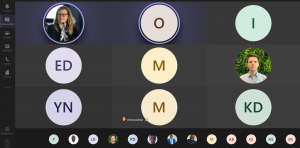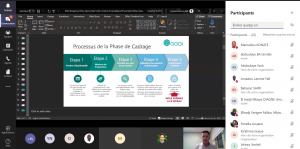
On 7 July 2020, GGGI Senegal hosted a webinar in collaboration with the Ministry of Environment and Sustainable Development (Directorate of Environment and Classified Establishments) and the National Committee for Climate Change ( COMNACC ) on Designing policy approaches under the Article 6 of the Paris Agreement.
Under the Paris Agreement, all signatory countries are required to set their Nationally Determined Contributions (NDCs) to reduce their CO2 emissions. At the same time, Article 6 of the Paris Agreement provides for international trading of emission reductions through the Internationally Transferred Mitigation Outcomes (ITMOs) mechanism. Although the rules associated with Article 6 have yet to be established, any international trading will have to be authorized by the seller country to avoid double counting, thus allowing the movement of the corresponding emission reductions between the registries of the seller country to the buyer country/entity. Therefore, policy approaches are a new area of study to examine the establishment of a carbon pricing mechanism, either explicit or implicit, that can lead to transformational changes in the long-term decarbonization process of national.
A financial agreement was signed between GGGI and Norway to support a number of countries, including Senegal, in the design of Article 6 policy approaches. The project will be carried out in two phases. The first scoping phase is an initial assessment, at the national level, of the legal and regulatory framework and sectors in order to identify potential opportunities. This first phase will reduce the list of the 8 countries initially targeted (Colombia, Mexico, Peru, Vietnam, Indonesia, Morocco, Thailand and Senegal) to a shortlist of up to 4 countries. Following a field mission in Senegal in February 2020, an assessment of NDCs, review of policies, and identification of existing activities in coordination with partners have led to the preparation of a country report. The report presents the assessment of the scale of possible emission reductions based on identified sectors and for Senegal in the energy sector (electricity generation). The results of this process will lead to the prioritization and selection of the short list of 4 countries for the second phase which aims to further develop these policy approaches.
.
It is in this context the webinar was organized. It showcased the report, related to the first stage of the project. An evaluation of the existing legal framework should allow to identify opportunities for reform in accordance with NDCs to measure the level of emissions reductions attractiveness. The results of the exercise would deliver eligibility criteria indicators for the second stage.
Senegal has a potential for emissions reductions specially in the energy sector. And the presenter Stephan Gill outlined the framing level process and invited COMNACC members to prepare the Letter of Intent, signed by the Senegal states, as a political commitment of the country and its willingness to be considered for the second phase of the process.
The ceremony was chaired by COMNACC president, M. Fall, with the presence of members whom belong to sectorial departments, environment & classified establishments and GGGI staffs. Participants welcomed the initiative and also made some recommendations on the direction to the sectorial reforms, identified in the senegal context, into a brief note.
The COMNACC members have confirmed their interest for the project and advised Senegal to pursue the process by applying for the second phase. Ms. Madeline Diouf Sarr from DECC, GCF focal point and secretariat of COMNACC has requested GGGI to elaborate the Terms of reference on the second phase to provide more context and guidance on the implications for the country and next steps. The ToRs will be the supporting document of the letter of intent that will be submitted for signature.